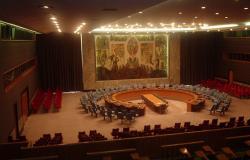UNSC Multilateralism, Peacekeeping and the War in Ukraine

Takamitsu Hadano examines the role of multilateralism in the UN Security Council in the context of the Russo-Ukrainian War and beyond with a focus on issues surrounding international peacekeeping.
Russia’s invasion of Ukraine signified the collapse of multilateral efforts since 2014 to resolve the Ukrainian crisis in a peaceful manner. Multilateral frameworks such as the Normandy Format and the Trilateral Contact Group failed to prevent the outbreak of the war in Ukraine. Multilateralism suffered a further blow when Russia vetoed a draft resolution condemning Russia’s acts of aggression against Ukraine at the UN Security Council (UNSC) meeting held on 25 February 2022. The UNSC has yet again found itself in a deadlock and has been ineffective in halting acts of aggression by one of its permanent members.
A concern has recently been raised regarding the possibility that the Organization for Security and Co-operation in Europe (OSCE), which is ‘one of the only remaining multilateral spaces for cooperation between Russia and the West’, could become incapacitated as a result of the war in Ukraine. In terms of conflict resolution, however, it might be even more important to make sure that some room is left for multilateral dialogue and cooperation at the UN, especially within the UNSC. Less than a year ago, the UNSC debated the need to uphold multilateralism to tackle global challenges. Today, multilateralism in the UNSC seems to be on the verge of collapse.
The deterioration of multilateralism in the UNSC could have significant repercussions on many fronts. International peacekeeping is one such policy area. As UN Secretary-General António Guterres stated, ‘UN peacekeeping is a remarkable enterprise of multilateralism and international solidarity’. As such, UN peacekeeping operations presuppose the existence of multilateral cooperation and are largely dependent on it for their success. The current deterioration of multilateralism in the UNSC could become a stumbling block to the success of future UN peacekeeping operations, including in Ukraine.
To begin with, let us remember that the claim that Russian forces despatched to Ukraine are tasked with carrying out ‘peacekeeping functions’ is a complete travesty of peacekeeping. UN Secretary-General Guterres was right in condemning this as ‘the perversion of the concept of peacekeeping’. What has happened in Ukraine is nothing less than a unilateral and unprovoked invasion and has nothing to do with multilateralism which underpins international peacekeeping.
International peacekeeping proper, however, could potentially help put a ceasefire in place, address the humanitarian disasters caused by the war, and provide the foundations for lasting peace in the region. It is argued that a future peacekeeping operation in Ukraine could be orchestrated by a multilateral organisation such as the UN and OSCE. It is also suggested that a ‘Mixed Commission’ be set up to supervise a ceasefire. Whichever option is to be chosen, the terms of a peacekeeping mandate would have to be negotiated and agreed upon in some multilateral setting, such as the UNSC, the Normandy Format or the Trilateral Contact Group. Alternatively, a new multilateral framework could be created for this purpose.
If a UN-sponsored peacekeeping mission is the preferred option, the consent of both Ukraine and Russia would have to be secured. This is not only because the consent of the main parties to the conflict must be obtained in accordance with the basic principle of consent, but also because such a mission would have to be approved by the UNSC where Russia has a veto. Therefore, the realisation of the idea of a UN-sponsored peacekeeping mission would be contingent upon whether there is at least a modicum of multilateralism in the UNSC.
It is, of course, possible to send a peacekeeping mission to Ukraine without obtaining Russia’s consent. Indeed, the controversial idea of sending NATO peacekeepers to Ukraine has been floated by Poland. The dominant view among NATO member states, however, is that such an operation is unrealistic because it would lead to a direct confrontation between NATO and Russia, thereby deepening the war rather than putting an end to it. Besides, such an operation might be used as a pretext by the Russian government for sending Collective Security Treaty Organization (CSTO) ‘peacekeepers’ on an out-of-area mission without a UNSC approval. This is by no means a speculative issue in light of the CSTO’s ‘peacekeeping’ intervention in Kazakhstan in January 2022.
The deterioration of multilateralism in the UNSC could have broader repercussions on existing and future UN peacekeeping operations beyond the war in Ukraine. The permanent members can use a veto threat to negotiate the details of the mandate of a UN peacekeeping operation. Moreover, it has been shown that, much to the detriment to the maintenance of international peace and security, there were occasions where a permanent member of the UNSC used or threatened to use its veto to effectively block the creation of a new UN peacekeeping operation or to prevent the renewal of an existing one for (geo)political reasons. As of writing, the worsening relations between the West and Russia have not caused complete disruption of UNSC meetings and activities. On 15 March 2022, the UNSC adopted a resolution extending the mandate of the United Nations Mission in South Sudan (UNMISS) although Russia and China abstained from the vote. Even in times of growing antagonism, efforts need to be made to ensure at least a minimum level of multilateralism in the UNSC so as to avoid a nightmarish situation in which UN peacekeeping operations are suddenly shut down across the world.
Similar problems could arise in any other policy area where the UNSC plays a central role. For example, the Security Council has played a key part in organising and implementing international sanctions regimes. The maintenance and effectiveness of the regimes requires the preservation of at least a modicum of multilateralism in the UNSC. Thus, if the regimes are to be kept in place, efforts need to be made to preserve what remains of multilateralism in the UNSC.
None of the above discussion is meant to suggest that Western and like-minded governments should be soft on Russia’s invasion of Ukraine. As a matter of first priority, governments supporting the principles of sovereignty and territorial integrity should take coordinated measures, including economic and financial sanctions, to put pressure on the Russian government to cease hostilities immediately and to withdraw its troops from the Ukrainian territory. When a ceasefire is eventually achieved, post-war reconstruction in Ukraine and the provision of humanitarian assistance should take precedence over the normalisation of economic and financial relations with Russia. War crimes committed in Bucha and other cities and towns must be investigated and those responsible must be held accountable. What has been pointed out above is just a reminder that the UNSC is designed to work effectively when and only when there exists some degree of multilateralism among the UNSC members.
Working through the UNSC is not the only way to resolve the war in Ukraine or, for that manner, any other conflict in the world. Legality aside, governments frustrated with the UNSC could choose to bypass it. They could seek to reform the current UN system. Indeed, the war in Ukraine will likely spark a renewed debate on UNSC reform. Alternatively, governments could even take a bold step and seek to establish a new international peace organisation.
Before opening a Pandora’s box of international legal and constitutional issues, however, it would be prudent to seek to make the existing UN system work better. If a peaceful resolution of the war in Ukraine is to be achieved on the basis of the existing UN system, and if long-standing UN efforts to establish peace and stability across the world are to be safeguarded against possible negative repercussions of the war, the UNSC members, especially the permanent members, must be urged to preserve at least a modicum of multilateralism among themselves so that some room is left for the UNSC to function properly and to discharge its responsibilities.
Takamitsu Hadano is Lecturer of International Security and International Political Theory at Hiroshima City University, Japan.
Image: Amit Chattopadhyay via Flickr (CC BY 2.0)


